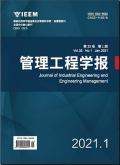管理工程学报2024,Vol.38Issue(4):149-169,21.DOI:10.13587/j.cnki.jieem.2024.04.010
产品线竞争环境下的生产成本信息分享策略
Strategies on sharing information on the cost of products considering the competitive environment on product lines
摘要
Abstract
The development of information and internet technology makes it is easier to implement a mechanism to share information in the supply chain system,which should enhance its efficiency of operation.However,in practice,there are few cases in which manufacturers share information about the production cost with retailers,and most manufacturers worry that sharing the information on production costs will cause them to lose their advantage in being privy to this information.Therefore,the motivation and strategy of manufacturers to share their information on production costs is a problem worthy of discussion.In this study,we considered a secondary supply chain with a Build to Order(BTO)mode,including a manufacturer and a retailer who simultaneously order two alternative products of high-and low-quality.Our purpose was to study the strategy of sharing information about the strategy of manufacturers'production cost in the competitive environment of different product lines,which factors in the retailer's error in estimating the production cost and their behavior in returning products.Simultaneously,considering the interactions between the retailer and manufacturer,this study examined the strategy of acquiring the information of production costs under the condition in which the retailer pays for the cost of acquiring this information. From the manufacturer's perspective,we used game theory to study their strategy of sharing information about the production cost under different market competition environments,return cost,and unit product yields.We found that the manufacturer's strategy of sharing information about the production cost is related to the retailer's error of estimating the production cost and return behavior.When there is fierce market competition,manufacturers tend not to share information to reduce errors in estimating the production cost of high-quality products.When the market competition is not fierce,manufacturers only tend to not share information when the cost of returns is low. The difference in profits between whether the manufacturers share information or not reflects the value of this information.By comparing the value of information under different errors of estimating the production cost,we analyzed the interaction between the retailer's ordering and pricing strategy and the manufacturer's strategy of sharing information.We found that when the retailers pessimistically estimate the production cost of the product line,the manufacturers do not share the information on the production cost only when the error of estimating the production cost of high-quality products is less than that of low-quality products,and there is fierce market competition.Otherwise,manufacturers will always share the information about the production cost.However,when retailers only pessimistically estimate the production cost of one product,if they pessimistically estimate the production cost of high-quality products,and the sum of the product of the real value of the production cost and the estimation error is not negative,manufacturers always choose to share information.Otherwise,information sharing is the threshold strategy of market competition and return cost.Similarly,when retailers are optimistic about estimating the production cost of product lines,the manufacturers'strategy of sharing information is related to market competition.If the market competition is fierce,manufacturers share(do not share)information when the relative error of estimating the production cost of high-quality products is not less than(less than)that of low-quality products.If the market competition is not fierce,information sharing is the threshold strategy of return cost;i.e.,the manufacturer shares(does not share)information when the return cost is high(low).Simultaneously,when affected by the unit rate of return,when there is a higher unit rate of return of products,the manufacturers increasingly tend to change from never sharing information to sharing it. From the retailer's point of view,their strategy to acquire information on the production cost is related to retailer's cost of acquiring this information.When the manufacturer chooses to share the information on costs,the retailer will not take the initiative to obtain the information about the manufacturer's production cost.When the manufacturer does not share the cost information,the retailer's acquisition of information is a threshold strategy about the cost of acquiring it.A lower cost of acquiring information results in the retailer being more likely to take the initiative to obtain information. Finally,we used a numerical analysis to discuss the impact of sharing strategy on the rate of growth of the manufacturer's value of information and the rate of growth of profits of the retailer and supply chain.This showed that when retailers pessimistically estimate the production cost of product lines,the information shared by the manufacturers always facilitates the growth of retailers and supply chain profits.However,when retailers only pessimistically estimate the production cost of one product or both optimistically estimate the production cost of the product line,the strategy of manufacturers to share information does not facilitate the growth of retailers and supply chain profits. This study enriches the research of information sharing in the supply chain and provides theoretical support and practical guidance for the manufacturers'decision-making to share private information on the production cost based on errors of the estimation of production costs of downstream enterprises.关键词
信息分享/生产成本/产品线竞争/估计误差/退货行为Key words
Information sharing/Production cost/Product line competition/Estimation errors/Return behavior分类
管理科学引用本文复制引用
戴宾,陈金枝,喻家乐..产品线竞争环境下的生产成本信息分享策略[J].管理工程学报,2024,38(4):149-169,21.基金项目
国家自然科学基金项目(72171178、71671133、71831007) The National Natural Science Foundation of China(72171178,71671133,71831007) (72171178、71671133、71831007)

